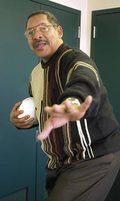I had a challenging experience last night - I went back to lecture about non-zero-tolerance approaches at a school whose drug and alcohol education awareness night I had used as a negative example in Addiction-Proof Your Child.
The Stanton Peele Addiction Website, October 24, 2008. This blog post also appeared on Stanton's Addiction in Society blog at PsychologyToday.com.
Teaching high school kids how to drink
 I had a challenging experience last night - I went back to lecture about non-zero-tolerance approaches at a school whose drug and alcohol education awareness night I had used as a negative example in Addiction-Proof Your Child. The topic was "Taking the abuse out of alcohol consumption."
I had a challenging experience last night - I went back to lecture about non-zero-tolerance approaches at a school whose drug and alcohol education awareness night I had used as a negative example in Addiction-Proof Your Child. The topic was "Taking the abuse out of alcohol consumption."
In my usual dialoging style, I questioned the usefulness of ignoring the ubiquity of drinking - youth drinking included - in the community. I asked five questions - "How do people learn?" (experience), "Is alcohol good or bad?" (it depends how you use it), "How many adults in the audience drink?" (the large majority, excluding the recovering people), "How did you learn to drink" (a recovering guy described bingeing with friends, an Italian man described a carafe of wine at Sunday dinner), and then - "What would be the best way for young people to learn to drink?" In summary, my question to parents was, "Who is going to teach your child how to drink?"
Along the way I reviewed international data showing Irish men infrequently drink, but frequently binged when they do (they drink outside the home at pubs) - the exact opposite of Italian men (who drank at meals at home or in restaurants). I then showed massive differences in teen drunkenness between Irish and Southern European 15-16 year olds (a quarter of Irish young people were drunk three or more times in the last month, compared with fewer than 5% of the Southern European youths). The Southern European style is to teach young people to drink at home and with their family (the drinking age is 16, and parents can give children of any age alcohol in a restaurant).
I pointed out that 90% of young people drink by age 21 in America (the only country that initiates legal drinking at that age), and that the typical American youthful drinking style is bingeing (half of 21-year-olds and a third of 18-year-olds binged at least monthly). I disputed any indication of negative cognitive consequences from mild drinking by late adolescence, but noted that, no matter what drinking did or didn't do, binge drinking produced by far the worst consequences physiologically as well as safety-wise.
I ended by saying that addiction included more than alcohol and illicit drugs (for example, prescription meds, gambling, video games, et al.) and that the answer to addiction of all sorts involved more than modeling moderation - young people need a purpose in life, positive values, and enough independence to learn to regulate and control their lives.
I was assisted by a remarkably supportive panel, including a former student ("kids whose parents tell them never to drink at college have the worst experiences"), a psychiatrist from a prominent local rehab hospital ("the 12 steps are not the only way"), a pediatrician who had lived in Italy ("when my daughter went out with a kid who got falling down drunk, the local kids all pointed - ‘an American'"), and a high school counselor who found that the worst danger was from "helicopter" (constantly hovering) parents.
Repeatedly panel members noted the near-inevitability of teen drinking experiences, and the need for young people to learn positive lessons from them. All the panel members pointed out positive aspects of my message. I felt like I was at old home week! The extremely tense woman who invited me (whose courage I greatly admire) e-mailed me: "You really turned your local image 180 degrees around!" (At the previous assembly I attended, the police chief told me to sit down when I spoke from the audience.)
Pshewww! So far this October I spoke in Killarney, Ireland about life education as an antidote to addiction; in Halifax about whether young people can learn moderate gambling; and last week in London (at the British Museum) about the future of addiction in the 21st Century. But nothing matched the tension of talking at a local high school about "Taking the abuse out of alcohol consumption."





